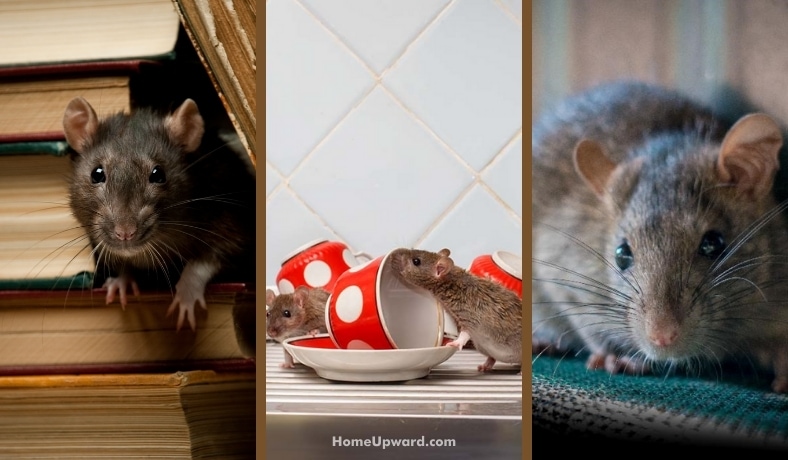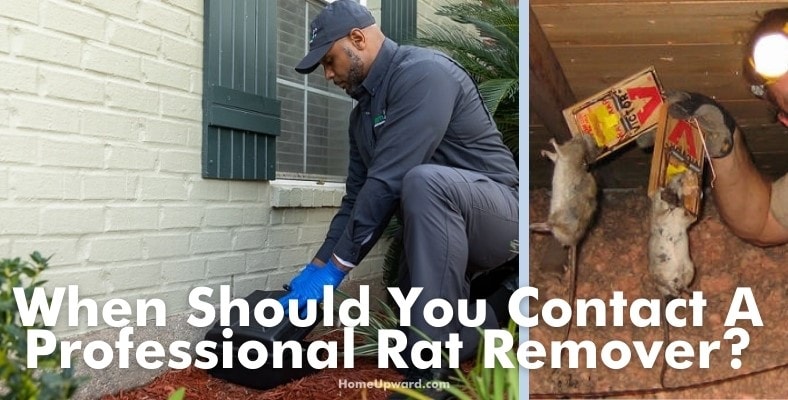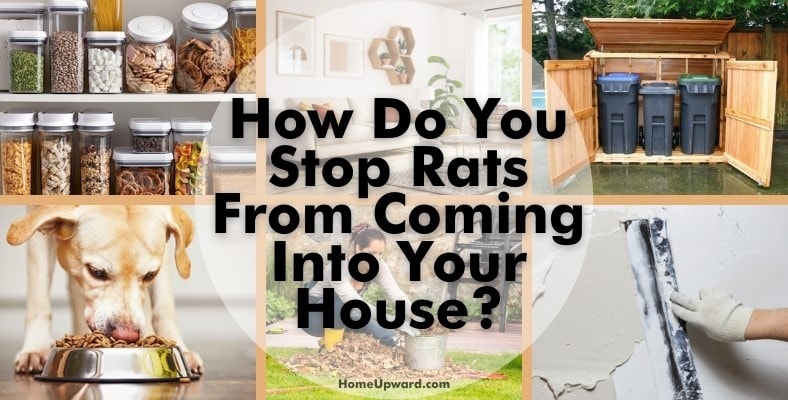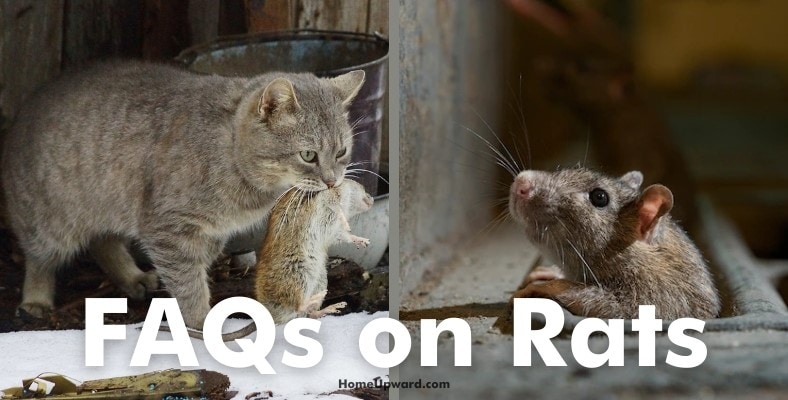If you’re looking for a “how to keep rats away from home remedy,” then you’ve come to the right place! Here, we discuss easy home remedies, DIY remedies, and methods to keep rats away and answer a few important rat-away questions.
Contents
Home remedies to help keep rats away
The best way to keep rats away from your home is to prevent them from entering it in the first place.
However, once they do get into your house, you never know where they are hiding. Once you have figured out they are in your home, it’s time to kick them out.
Easy home remedies to keep rats away
One quick and easy rat-away solution is peppermint oil. While humans enjoy the sharp smell of peppermint, rats do not, so soak a few cotton balls in the oil and place them in front of openings rats may get in.
Hot pepper flakes work on rats and other insects alike. This seasoning may make you sneeze a little, but it keeps rats and other pests that you don’t want away.
DIY remedies to keep rats away
One of the most important ways to keep rats away is to seal any hole or opening they can enter your home. Mice can fit through an opening about an inch wide, and rats need just a tiny bit more space to enter. Find any and all small gaps, and seal them. Spray foam, sealant, and even caulk is an effective way to keep mice out.
You can buy commercial rat traps at most home improvement or big box stores. Place tasty bait, such as a small piece of cheese, into the rat trap, and place the traps in your attic or outside your home. Some traps permanently trap the rats, whereas some can be emptied. Other types of rat traps include:
- Plastic snap traps
- Multiple catches
- Live traps
- Glue boards
- Wooden snaps
- Humane rodent zappers
- Metal pedals
- The rat trap cage
- Electric traps
- Refillable bait stations
Ammonia can be a useful tool against rats. Put ammonia into a spray bottle that can be sealed, and spray it onto cotton balls or small bits of cotton. Then, place the balls nears rat holes or little corners. Just as it can make humans feel as if they are choking, it can make rats choke too!
Pests like rats, insects, and mice are attracted to dust, dirt, and clutter. If you have an area with many cardboard, boxes, or luggage that dust can build upon, then the rodents are sure to find it. Clear away clutter, and don’t leave cardboard directly on the ground.
If you have a pantry, don’t store food on the bottom shelf. Don’t leave food out on the counters, and make sure that any crumbs or spills are cleaned up from floors. Rodents especially like pet food, such as dog or cat food, or even food for livestock. Keep any pet food in sealable containers to not attack pests.
Where should you place rat traps?
First, you should know that you can’t go wrong using too many traps. The number of rats in your home is often much larger than you think, so get a few more traps than you think you’d need.
Place the trap as close to where they gather as possible. If you do not know where their gathering is located, place traps in areas where rat activity is high.
Make sure the trap is touching the wall, as rats like to travel next to walls to keep out of sight. Space the traps about 15 feet apart.
Rats like dark, safe places, so traps hidden within objects or are already enclosed, may work better and also safer for pets or children.
When should you contact a professional rat remover?
When you see signs of rats, it’s important to take immediate actions to take care of the problem. If the droppings are still moist, they are new, but older droppings may appear gray and dark.
If you have tried DIY solutions and still have a rat or mice problem, then it’s time to call a professional to help you wipe them out.
Signs you have a rat infestation
It is better to prevent rats from coming inside in the first place.
However, if you can notice signs of rats before they create a colony, you can prevent the rat population from growing and spreading.
Signs you may have a rat infestation include:
- Rat droppings
- Urine stains or strange dark stains in cabinets
- Gnaw marks, or small piles of sawdust
- Scratches or holes in cabinets or holes in bags, cardboard boxes, or small containers
- You hear skittering sounds in the walls or in your kitchen
- Small nests created from tiny, shredded materials
- Small, low rub or smudge marks
- Scratching noises in walls, ceiling, cabinets, or attics
- Footprints
How do you stop rats from coming into your house?
The best way to keep rats out of your home is to ensure they do not get into your house, to begin with.
Practical ways to prevent rodents from entering your home include:
- Keep food in metal, glass, or thick containers with lids.
- Do not leave clutter on the ground.
- Ensure garbage inside has a secure lid, and soiled garbage bags are put into outdoor cans with secure lids.
- Always clean up pet or livestock food.
- Clean debris from gardens.
- Inspect your home and seal any openings or holes they can get through.
What attracts rats?
Rats are like many of us – they will head towards something that smells good.
Rodents like odors and smells that pets create, such as waste, dander, and pet food bowls.
They also like human refuse like garbage, compost bins, outdoor grills or smokers, gardens, fruits, herbs, and tree nuts.
A few surprising things that attract rats include water, such as dripping pipes, and indoor plants. If you like large plants, keep them in a safe spot.
What diseases do rats carry?
The Center for Disease Control (CDC) has a list that highlights diseases rodents can directly transmit, but the list does not contain all the possible diseases. It features diseases such as:
- Hemorrhagic fever
- Plague
- Salmonellosis
- Tularemia
- Hantavirus pulmonary syndrome
Indirectly, rodents can also transmit diseases that can lead to death such as tick fever, Lyme disease, spotted fever, and even West Nile Virus!
If you contract one of the 35 plus diseases that can be spread from rodents to humans, seek medical treatment immediately!
Can rats infect my pets?
Rats can spread deadly diseases to pets, especially birds, cats, and dogs.
One of the most dangerous diseases they can spread is toxoplasmosis, which can cause damaging nervous system illnesses.
If your pet catches, kills, or eats a rodent, seek veterinary treatment.
FAQs on rats
Here are some frequently asked questions on rats and mice.
Are mice and rats scared of my dogs?
Yes! Small rodents are often scared of dogs and cats. Certain breeds, such as hunting or hound dogs, are known to track and retrieve pests. Rodents can carry diseases, however, so make sure they don’t eat them!
Do cats eat mice?
Yes, some cats will eat the mice they catch. However, many cats will not actually kill the pests, but just capture and play with them. If your feline friend catches a rodent, dispose of it carefully.
Do rats avoid light?
Many rodents prefer dark places or areas that are hidden away. Small, dark, secluded areas are particularly attractive to rats because they offer a safe place for them to breed. While rats are normally more active at night, they can still see in the light and come out in the day.






